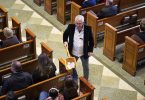By Most Rev. Michael O. Jackels
Bishop of Wichita
This is the first in a series of reflections related to the upcoming election offered by the leaders of the four dioceses in Kansas.
The intention of this reflection (and those to follow) is not to endorse or oppose a particular candidate, political party, or political action committee. Instead, it is to show how human reasoning, enlightened by our Catholic faith, shapes our thinking, choosing and acting in daily life, including the most basic obligation of citizenship: voting.
The practice of our Catholic faith is not reserved only to Sunday or to the worship of God at holy Mass; rather, it is a way of life intended to affect our thinking, speaking and acting, whether we are at home with family, at work, at play, or in the voting booth.
In this regard, our Catholic faith is very relevant, and the practice of it makes the world a different, a better place. How? By making Catholics and the way we think, speak and act different, even better.
The practice of our Catholic faith illumines our human reasoning and elevates us as persons. Our Catholic faith forms in us the following values, just to name a few:
We are a part of others, not apart from them — We see ourselves as one with God, with other Catholics (all over the earth, in purgatory and in heaven), and with the human family in general. It makes a difference when we think not only of me and mine, but of we and ours as well, inclusive of God, family, friends, parishioners, fellow citizens, strangers, even enemies.
We care for others because we care about them — As a consequence of our oneness, we take responsibility for one another. Our duty to care for others is greatest when their ability to care for themselves is least. This duty begins and is greatest at the moment of conception until birth. It lessens, though never entirely, as people grow into adulthood, and increases again as they age or become sick. Of course, our duty to care for others always remains great even toward adults when they are mentally or physically disabled, or are unable to secure for themselves the basics of a dignified life.
We regard human life as sacred — As just noted, our reverence for human life inspires us to care about and for others, especially to protect and defend people from harm. No one is justified in taking another human life, except in self-defense, as in a just war or capital punishment (though in the United States, in these modern times, the cases are very rare, if not practically nonexistent, in which the execution of the offender is an absolute necessity to defend ourselves against an unjust aggressor). Homicide, suicide, abortion, euthanasia, and embryonic stem-cell research are actions that kill another human life and that can never be morally justified.
We honor marriage and family life — New human life is created as the fruit of the love between one man and one woman who, by their own free will, are joined by marriage in a faithful and lifelong relationship. This is the ideal for marriage that we learn from nature and from God. We strive to promote and defend this ideal because it is the best way to conceive new life, to nurture a child with the unique love of both a father and a mother, and to teach a child how to live in society.
We respect the dignity of every human person — People have a fundamental right to life, which serves as the basis for their dignity and for their right to those things needed to live in dignity: for example, productive work and fair wages, food and shelter, education and health care, protection from harm, and the right to move from one country to another when these things are not available. How these things are made available to people is a matter of prudential judgment, where people of good will might disagree.
We serve, even make sacrifices, to benefit others — Service and sacrifice are among the best ways to show that our neighborly love is authentic, which in turn shows that our love of God is genuine. Our service is humble and our sacrifice complete such that no service is beneath our dignity and no sacrifice beyond us. If at a given moment we cannot respond in proportion to the need, we offer that we would if we could, and we will when we can.
We are stewards, not owners — No matter if we are talking about who we are, what we are able to do or what we have, and whether that is something we eat, wear or use, we recognize that it is not ours to do with as we please. Our role is rather to be responsible managers of all the above: for example, not owned, but loaned; to use, not abuse; to employ for the intention of the owner (God); and to share with others. When we live these values, we help to make the world a different, a better place. If we did not live them, or lived by opposing values, the world would indeed be different, but certainly not better. In the coming months, there will be three more reflections like this one, on human life issues, the promotion of marriage and family life and the economy, aimed at forming consciences in preparation for the important act of voting.
Most Rev. Joseph F. Naumann
Archbishop of Kansas City in Kansas
Most Rev. Michael O. Jackels
Bishop of Wichita
Most Rev. John B. Brungardt
Bishop of Dodge City
Very Rev. Barry E. Brinkman
Diocesan Administrator of Salina






